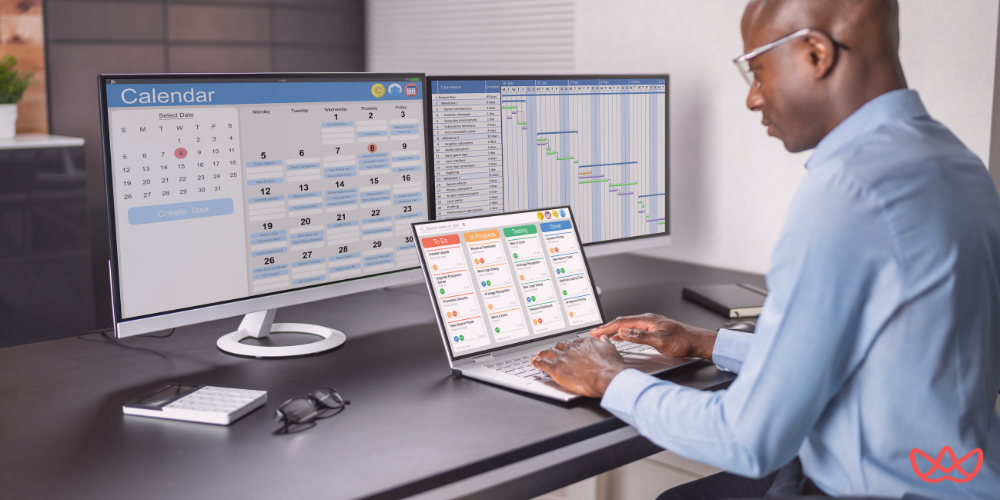What is a Digital Project Manager?

A Digital Project Manager (DPM) plays a vital role in overseeing digital projects, ensuring seamless planning, execution, and completion. Unlike traditional project managers, DPMs specialize in digital tools, online platforms, and remote collaboration, making them essential in today’s tech-driven landscape.
As digital transformation accelerates, the role has evolved to encompass both technical expertise and strategic business insight. This digital project manager key skills summary will explore their core responsibilities and how they differ from traditional project management.
Defining the Role
A Digital Project Manager (DPM) is responsible for guiding digital projects from start to finish, ensuring they stay on schedule, within budget, and aligned with business objectives. They collaborate with developers, designers, and marketers to drive seamless execution.
A key aspect of this digital project manager's key skills summary is their expertise in digital tools like Asana, Jira, and Slack, which help optimize workflows. Additionally, a solid grasp of web development and UX/UI principles allows DPMs to effectively coordinate with technical teams and maintain high usability standards.
How Digital Project Management Differs from Traditional Project Management
While both digital and traditional project managers oversee teams and project success, digital project managers operate in virtual environments, requiring strong communication and adaptability. This digital project manager key skills summary includes expertise in managing remote teams and using collaboration tools effectively.
They must also navigate rapid technological changes and continuously update their skills to stay competitive. With digital transformation accelerating across industries, DPMs play a crucial role in ensuring projects remain relevant, making this a highly sought-after career path.
Key Responsibilities of a Digital Project Manager
Digital Project Managers are essential to delivering successful digital projects, ensuring they stay on time, within scope, and on budget. Your digital project manager's key skills summary must include leadership, risk management, and effective communication with stakeholders.
Beyond managing tasks, they coordinate teams and leverage digital tools to streamline workflows. Mastering these responsibilities is key to driving project success in an increasingly digital landscape.
Leading Cross-Functional Teams
Digital Project Managers are key to successful project completion. Their core responsibility is leading cross-functional teams, which involves:
- Team Leadership: Bringing together diverse skill sets (e.g., developers, designers, marketers) and aligning them towards a common goal.
- Motivation & Alignment: Ensuring all team members are motivated and working towards project objectives.
- Effective Communication: This is crucial for leadership and conflict resolution.
- Collaboration: Fostering a collaborative environment to enhance productivity and drive successful project outcomes.
Managing Project Scope, Timeline, and Budget
Digital Project Managers also have a critical role in managing project constraints:
- Scope Management: Defining clear project boundaries to prevent scope creep.
- Timeline Management: Setting realistic deadlines and ensuring timely delivery.
- Budget Management: Keeping the project within the allocated budget.
- Consequences of poor management: Budget overruns can cause financial strain, while delays can lead to missed opportunities.
- Key to Success: Meticulous planning and ongoing monitoring are essential.
Facilitating Stakeholder Communication
Effective communication is crucial for Digital Project Managers:
- Stakeholder Management: Acting as a liaison between the project team and stakeholders.
- Key Communication Activities:
- Regular project updates.
- Managing stakeholder expectations.
- Addressing concerns promptly.
- Benefits of Good Communication:
- Builds trust.
- Fosters collaboration.
- Enhances stakeholder satisfaction.
- Contributes to achieving project goals.
Overseeing Risk Management and Problem-Solving
Digital Project Managers must also be adept at:
- Risk Management:
- Proactively identifying potential project risks.
- Developing contingency plans to mitigate those risks.
- Preventing project derailment.
- Problem-Solving:
- Quickly devising solutions to issues that arise.
- Utilizing critical thinking skills.
- Adapting to changing circumstances to keep the project on track.
Implementing Project Management Methodologies
Finally, Digital Project Managers are responsible for:
- Methodology Implementation:
- Selecting and implementing appropriate project management methodologies (e.g., Agile, Scrum, Waterfall).
- Using these methodologies to provide a structured framework for project management.
- Benefits of Methodology Use:
- Ensures all project aspects are covered.
- Keeps the team focused on the end goal.
- Enhances productivity.
- Contributes to successful project outcomes.
Essential Skills for a Digital Project Manager
A digital project manager's key skills summary must include leadership, technical expertise, and adaptability to navigate evolving digital landscapes. Success in this role requires balancing business acumen with flexibility, ensuring projects align with strategic goals while managing challenges effectively. Mastering these skills enables DPMs to drive seamless project execution and foster collaboration across teams.
1. Leadership and Team Management
Motivating and Guiding Teams
Effective leadership is about inspiring and guiding teams toward common objectives. A Digital Project Manager must cultivate a positive team environment, fostering collaboration and motivation. By setting clear goals and providing constructive feedback, DPMs can drive team performance and project success.
Managing Conflicts Effectively
Conflicts are inevitable in any project. A skilled DPM addresses these challenges by employing conflict resolution strategies, ensuring issues are resolved swiftly, and maintaining team cohesion. This involves active listening, empathy, and finding mutually beneficial solutions.
2. Communication and Collaboration
Stakeholder Management
Managing stakeholder expectations is a critical component of project success. DPMs must communicate effectively with all parties involved, ensuring transparency and alignment with project goals. This involves regular updates, clear documentation, and managing feedback constructively.
Effective Meeting Facilitation
Meetings are a staple of project management. A DPM must facilitate productive discussions, ensuring all voices are heard and meetings are time-efficient. This includes setting clear agendas, managing time effectively, and following up on action items.
Negotiation and Conflict Resolution
Negotiation skills are essential for balancing stakeholder needs and project constraints. A DPM must navigate these interactions diplomatically, finding solutions that satisfy all parties while keeping the project on track.
3. Project Management Methodologies
Agile, Scrum, and Waterfall
Understanding various project management methodologies is crucial for a DPM. Whether it's Agile, Scrum, or Waterfall, selecting the appropriate framework can significantly impact project outcomes. Each methodology offers unique benefits, and a DPM must choose based on project requirements and team capabilities.
Choosing the Right Methodology for a Project
Deciding on a methodology involves assessing project scope, timeline, and team dynamics. A DPM must evaluate these factors to determine the most suitable approach, ensuring efficient project execution and delivery.
4. Risk and Resource Management
Identifying Potential Risks
Risk management is a proactive approach to identifying and mitigating potential project challenges. A DPM must anticipate risks, develop contingency plans, and implement risk mitigation strategies to minimize impact.
Allocating Resources Efficiently
Resource management involves optimizing the use of available resources to achieve project goals. A DPM must allocate resources effectively, balancing project needs with budget constraints and ensuring optimal productivity.
Contingency Planning
Contingency planning is essential for managing unexpected events. A DPM must develop backup plans to ensure project continuity, allowing teams to adapt quickly and minimize disruptions.
5. Technical Knowledge and Digital Tools
Project Management Software (Asana, Jira, Trello)
Familiarity with project management software is crucial for tracking progress and managing tasks. Tools like Asana, Jira, and Trello help DPMs organize workflows, assign tasks, and monitor project milestones.
Collaboration Tools (Slack, Microsoft Teams, Notion)
Collaboration tools facilitate communication and teamwork. Platforms like Slack, Microsoft Teams, and Notion enable real-time collaboration, document sharing, and team coordination, enhancing project efficiency.
Basic Understanding of Web Development and UX/UI
A foundational understanding of web development and UX/UI design is beneficial for a DPM. This knowledge allows for better communication with technical teams and ensures project deliverables meet user experience standards.
6. Adaptability and Continuous Learning
Staying Updated with Industry Trends
The digital landscape is ever-changing, and a DPM must stay informed about industry trends and emerging technologies. Continuous learning ensures a DPM can adapt strategies and tools to maintain project relevance.
Learning New Tools and Methodologies
Embracing new tools and methodologies is essential for improving project efficiency and outcomes. This digital project manager key skills summary includes adaptability, innovation, and a commitment to continuous learning, ensuring success in an ever-evolving digital landscape.
7. Business Acumen and Strategic Thinking
Aligning Project Goals with Business Objectives
A DPM must ensure that project goals align with broader business objectives. This involves strategic planning, stakeholder collaboration, and aligning project outcomes with organizational priorities.
Understanding Client and Market Needs
Understanding client and market needs is essential for delivering value-driven projects. A DPM must conduct market research, gather client insights, and tailor project deliverables to meet these requirements.
How to Improve Your Digital Project Manager Skills
Continuous learning, leadership development, and technical proficiency are essential for excelling in digital project management. To stay competitive, professionals should pursue certifications, gain hands-on experience, and refine their expertise in industry tools.
This well-rounded digital project manager key skills summary includes adaptability, strategic thinking, and the ability to lead teams effectively. By embracing these strategies, DPMs can drive successful projects and advance their careers.
1. Obtaining Certifications (PMP, CSM, PRINCE2)
Certifications are valuable for Digital Project Managers:
- Benefits of Certifications:
- Demonstrate knowledge and expertise in project management methodologies.
- Provide a competitive edge in the job market.
- Equip you with the latest methodologies and best practices.
- Help you adapt to various project demands.
- Key Certifications:
- PMP (Project Management Professional): Globally recognized, demonstrates effective project management skills.
- CSM (Certified ScrumMaster): Ideal for Agile environments.
- PRINCE2: Offers a structured approach to project management.
- Preparation: Consider enrolling in courses offered by reputable institutions to prepare for these certifications.
2. Enhancing Proficiency in Project Management Software
Digital Project Managers should be proficient in project management software:
- Importance of Software Proficiency: Essential for efficient project execution.
- Examples of Useful Tools: are Asana, Jira, and Trello.
- Benefits of Using These Tools:
- Streamlined task management.
- Facilitated team collaboration.
- Real-time project tracking.
- Enhanced productivity and project outcomes.
- Improving Software Skills:
- Explore online tutorials, webinars, and workshops.
- Utilize free resources and training modules offered by software providers.
- Practice and experiment regularly.
3. Strengthening Leadership and Negotiation Skills
Strong leadership is essential for Digital Project Managers:
- Key Leadership Responsibilities:
- Inspiring and guiding the team towards project goals.
- Understanding team dynamics.
- Fostering a positive work environment.
- Effectively managing conflicts.
- Negotiation Skills: Crucial for:
- Resolving disputes.
- Securing resources.
- Aligning stakeholder expectations.
- Developing Leadership & Negotiation Skills:
- Attend leadership workshops.
- Enroll in negotiation courses.
- Combine practical experience with theoretical knowledge.
4. Gaining Hands-on Experience Through Real Projects
Real-world experience is invaluable for Digital Project Managers:
- Importance of Experience: Applying theoretical knowledge in practical settings.
- Gaining Experience:
- Seek opportunities within your organization to lead or participate in diverse projects.
- Volunteer for projects outside your comfort zone.
- Join professional networks or online forums for collaboration and shared insights.
- Benefits of Diverse Experience:
- Exposure to different challenges and scenarios.
- Broadened perspective.
- Enhanced problem-solving skills.
Career Opportunities and Salary Expectations
With digital transformation accelerating across industries, professionals with a strong digital project manager key skills summary are in high demand. These experts drive the success of digital projects by managing budgets, timelines, and teams, making them invaluable in fields like technology, marketing, finance, and healthcare. As businesses strive to remain competitive, career opportunities and salary prospects for Digital Project Managers continue to grow.
Industries Hiring Digital Project Managers
With a strong digital project manager key skills summary, professionals can thrive in multiple industries. In tech, they oversee software projects, ensuring timely and cost-effective delivery. Marketing agencies depend on them to manage cross-functional teams, while finance and healthcare sectors require their expertise in implementing digital solutions like fintech tools and telemedicine platforms. Their adaptability makes them invaluable across various fields.
Salary Trends and Job Outlook
A strong digital project manager key skills summary can significantly impact earning potential, with salaries ranging from $70,000 to $120,000 in the U.S., and even higher in major tech hubs. Demand for this role continues to grow as companies prioritize digital initiatives, making it a lucrative career path. By refining essential skills, professionals can secure competitive salaries and long-term opportunities.
FAQs
What Is a Digital Project Manager?
A digital project manager is responsible for overseeing the planning, execution, and delivery of digital projects. This includes managing teams, timelines, budgets, and ensuring that the project aligns with the client's objectives. The role requires a blend of technical knowledge, leadership skills, and strategic thinking to successfully navigate the complexities of digital environments.
What Are the Important Skills for a Project Manager?
A well-rounded digital project manager key skills summary includes leadership, team management, and strong communication abilities. Mastery of Agile and Scrum methodologies, along with proficiency in tools like Asana, Jira, and Trello is crucial. Adaptability and continuous learning also play a key role in staying ahead of industry trends.
Is Project Management a Digital Skill?
Project management itself is not inherently a digital skill, but in today's digital age, having digital project management skills is increasingly important. This involves understanding digital tools and platforms, managing remote teams, and applying digital strategies to enhance project outcomes. As businesses continue to embrace digital transformation, the demand for digital project management skills is on the rise.
How to List Project Management Skills on a Resume?
When listing project management skills on a resume, focus on highlighting specific competencies such as leadership, communication, and technical skills. Use bullet points to clearly outline your experience with project management software and methodologies. Include examples of successful projects you've managed, emphasizing your ability to lead teams, meet deadlines, and achieve project goals. Tailor your resume to the job description to ensure relevance and impact.



.png)









